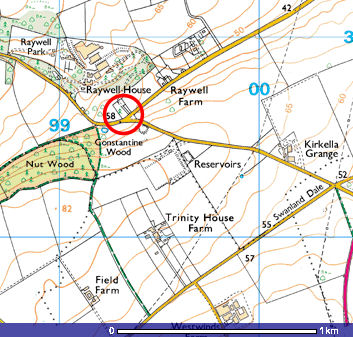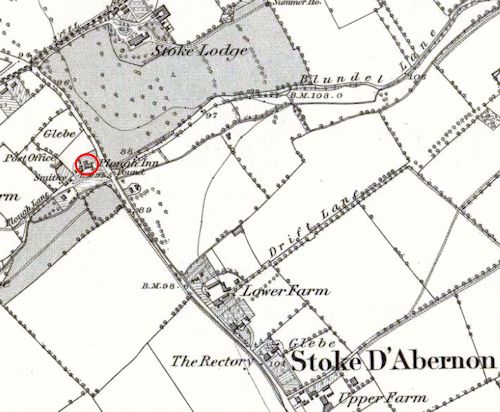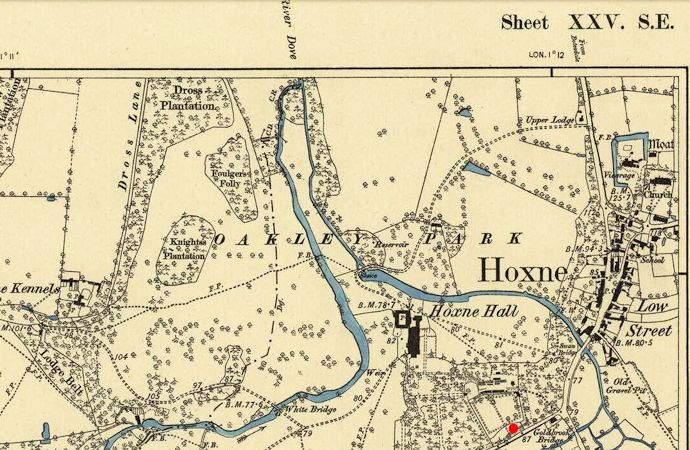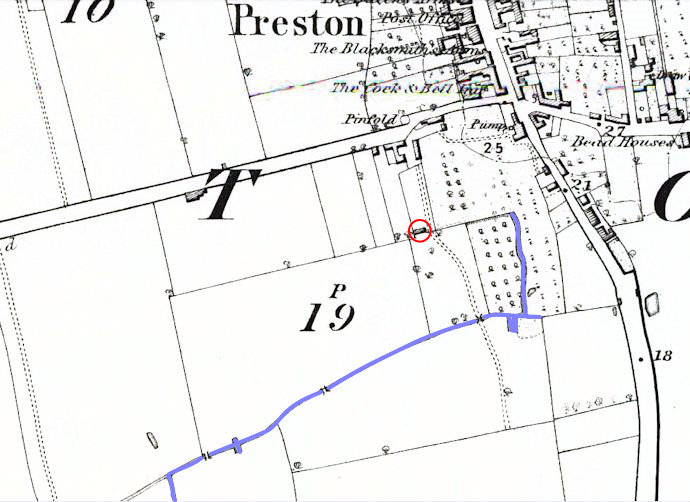 |
Left: Assumed to be Thomas Edmund Crompton dated c.1900 at Carrick Row Source: Sally Weston, with thanks |
1807 Info 2a: James Crompton
|
Thomas Edmund CROMPTON ...
... was born 5 May 1839 at Melton near North Ferriby (GRO ref: Howden 23 53). He trained as
a nurseryman with Backhouse Nurseries. During his life he lived at:
 |
Left: Assumed to be Thomas Edmund Crompton dated c.1900 at Carrick Row Source: Sally Weston, with thanks |
Cottingham - serving an apprenticeship
1861 Census Sun/Mon. 7/8th April 1861
Source: FHL Film TNA Ref RG09
Piece: 3576; Folio: 64; Page: 30; Sched: 171
Dwelling: Raywell Lodge
Place: Cottingham, York ER, England
Name Rel Mar Age Occupation Birthplace
Cornelius T Watherall Head M 32 Coachman Lincs, Grandborough
Elizabeth Watherall Wife M 32 Yorks, Barnby on Marsh
Charlotte Watherall Dau 2 Yorks, Raywell
John Hy Watherall Son 9mo Yorks, Raywell
Thomas E Crompton Lodger U 21 Gardener Yorks, Melton
Henry Weatherill Lodger U 23 Groom Lincs, Grantham
| Right: OS map showing the position of what is believed to be Raywell Lodge, Cottingham HU16 5YL |  |
His marriage to Mary Louisa MOORE
William and Mary Moore
b.....~1813 b.....~1812
|
|============|================|============|========||
Mary louisa Sarah harriette Edward William
b.13aug1841 b.13aug1841 b. b.
c.19sep1841 c.19sep1841 c.17mar1839 c.30apr1837
d.07sep1880
| Thomas Edmond married Mary Louise MOORE of Campsall, Doncaster, (GRO
ref: Doncaster 9c 627) who was born on 13 August1841 (family letter) in Stoke D'
Abernon, which is just inside the M25. (GRO ref: Epsom 4 120)
Right: Map locating Stoke D'Abernon, which also shows where one of the family lives in 2010 |
 |
| In the 1841 census, months before before Mary Louisa was born, shows that her mother
Mary and her two eldest children lived two doors beyond The Plough Inn The Enumerator
walked from Upper Farm, to the Rectory and Lower Farm and toward The Old Plough and River
Lane House. Mary's husband, William, is not with the family.
The Chelsea FC training ground is now opposite The Rectory.
Right: An close-up of the 1871 map locating the Plough Inn, Stoke D'Abernon. The cottages along Plough Lane, now Station Road, are thought to be where the MOOREs lived and Stoke Lodge, where William MOORE worked. |
 |
1841 Census Sun/Mon 6/7 June 1841
Source: FHL Film TNA Ref HO107
Piece: 1071; Book: 11; Folio: 8; Page: 11; Line: 18
Dwelling: [Two doors from the Plough Inn towards the Old Plough]
Place: Stoke D'Abernon, Surrey, England
Name Age Occupation Born in County
Mary Moore 30 Y
William Moore 4 Y
Edward Moore 2 Y
Note: Ages are usually rounded down to the nearest five years.
The 1841 census shows that Mary's husband was not living at home. William MOORE was one of seven servant at Stoke House, the home of the Phillips family.
1841 Census Sun/Mon 6/7 June 1841
Source: FHL Film TNA Ref HO107
Piece: 1071; Book: 11; Folio: 8; Page: 9; Line: 1
Dwelling: Stoke House
Place: Stoke D'Abernon, Surrey, England
Name Age Occupation Born in County
Mary Phillips 45 Independent Y
Frederick Phillips 20 N
....
William Moore 30 Male servant N
Note: Ages are usually rounded down to the nearest five years.
The History of The Manor, Stoke D'Abernon records that:
| 'In 1820, the Manor of Stoke D'Abernon was sold to Hugh Smith, a wealthy lawyer who
bought it and the advowson (the right to a benefice or living from the church) for his son
the Rev. Hugh Smith. On his death in 1852, it was purchased by the Rev. Frederick Parr
Phillips, the grandson of the Duc d’Orleans. The advowson came with it, (together
with practically the whole parish of about 1000 acres, including Bookham Lodge, Slyfield
House and all farms and cottages as far as the Tilt in Cobham).
Right: Stoke Manor pre-1850. At this time the Manor hosted many national events with garden parties and pageants on the lawns for local people. |
 |
This appears to contradict the 1841 census as there appears to be no record of a Hugh Smith in the 1841 census for Stoke D'Abernon.
Source: A history of The Manor, Stoke D'Abernon
Campsall, where they met
The family letter records that, in 1868, Thomas was a gardener at Campsall Hall. The 1851 census shows that the MOORE family had been living in Campsall since 1846 when the second set of twins were born. In 1851 Mary Louisa's mother kept a grocers shop. Her father William, though again absent from the family census, had risen to the rank of butler at Campsmount House.
1851 Census Sun/Mon 30/31st March 1851
Source: FHL Film TNA Ref H1O7
Piece: 2348; Folio: 125; Page: 7; Sched: 27
Dwelling:
Place: Campsall, Yorkshire, England
Name Rel Mar Age Occupation Birthplace
Mary Moore Head M 39 Grocer shop keeper Norfolk, Aslacton
Wm Moore Son 14 Scholar Surrey, Clapham
Edward Moore Son 12 Scholar Surrey, Stoke D Ab[ernon] Abnoe
Sarah Moore Dau 9 Scholar Surrey, Stoke D Ab[ernon]
Mary Moore Dau 9 Scholar Surrey, Stoke D Ab[ernon]
Letitia Moore Dau 5 Scholar Yorks, Campsall
Julia Moore Dau 5 Scholar Yorks, Campsall
1851 Census Sun/Mon 30/31st March 1851
Source: FHL Film TNA Ref H1O7
Piece: 2348; Folio: 130; Page: 17; Sched: 69
Dwelling: Campsmount [House]
Place: Campsall, Yorkshire, England
Name Rel Mar Age Occupation Birthplace
Agness Broich Serv M 48 Housekeeper Yorks, Brompton
Wm Moore Serv M 38 Butler Norfolk, Long Stratton
Harriet Armstrong Serv U 22 Housemaid Notts, Farnfield
Sarah Geldard Serv U 18 Kitchen maid Yorks, Brompton
| During the 18th century the Cooke-Yarboroughs built Campsmount. In the second world
war the house was used by the Ministry of Defence and afterwards it fell into disrepair
and was demolished during the 1960s.
Right: Campsmount House |
 |
In 1861 Mary was living in the same house as her now married twin, Sarah and her father-in- law.
1861 Census Sun/Mon. 7/8th April 1861
Source: FHL Film TNA Ref RG09
Piece: 3521; Folio: 95; Page: 12; Sched: 61
Dwelling:
Place: Campsall, York ER, England
Name Rel Mar Age Occupation Birthplace
Mark Culling Head M 59 Game keeper Norfolk, Sprowson
Caroline Culling Wife M 46 Norfolk, Burgh Apton
Mark Culling Son M 22 Woodman Norfolk, Brook
Sarah Culling D-i-L M 19 Surrey, Stoke
Honor Culling Dau U 17 Norfolk, Alpington
Laura Culling Dau U 12 Norfolk, Erlham
Mary Moore Bord U 19 House servant Surrey, Stoke
Arthur Culling Gson 1 Yorks, Campsall
Caroline L Culling Gdau 2mo Yorks, Campsall
The family letter records that, in 1868, Thomas Edmund was a gardener at Campsall Hall.
| During the 18th century Campsall was dominated by two families of landed gentry.
At one end, the Bacon-Franks built Campsall Hall. The villagers were still mostly employed
with farming and working on the two village estates. In the 1950s the Bacon-Franks
abandoned Campsall Hall. From 1956 the local authority and the National Coal Board
developed a large area of housing in Campsall Park and Campsall Hall was converted into
flats until 1986 when it was demolished. It is now Campsall Country Park on Churchfield
Road, DN6 9LH
Right: Campsall Hall in 1900 |
 |
| Right: A map locating Campsall, Doncaster |  |
Marriage
Source: GRO Marriages Crompton Thomas Edmund 3rd Quarter 1865 Doncaster 9c 627 Moore Mary Louisa 3rd Quarter 1865 Doncaster 9c 627
A short stay in Hoxne, Suffolk
By virtue of Edmond Thomas' birth that we know, shortly after their marriage, Thomas Edmund lived at Hoxne (pronounced Hoxon) in 1869 and, since he had been a gardener at large estate houses, it is assumed he was a gardener at Hoxne Hall/Oakley Park.
| Hoverbox Photo Gallery - Hoxne Hall, Suffolk This feature does not function correctly on phones and tablets |
| Left: Hoxne Hall circa 1819 | Centre: Church Street, Hoxne 1904 | Right: Hoxne Hall/Oakley Park 1904 |
| 1 | 2 | 3 |
|---|
Source: hoxne.net (Accessed: 23 October 2014)
When Edward Kerrison died on 09 March 1853, he was succeeded by his son Sir Edward Clarence Kerrison, 2nd Baronet (2 January 1821 – 11 July 1886), who probably employed Thomas Edmund. In 1921 Sir Edward ‘expended an immense sum’ making many improvements and alterations. It was renamed 'Oakley Park'. Sir John Benn Walsh reported '‘The furniture is costly in the extreme, vases, Buhl cabinets, porcelaine (sic) meet you at every turn’
 |
| Above: 1885 map of Hoxne, Suffolk showing Hoxne Hall. The red spot shows the position of the orchard gate. |
Oakley Park was demolished in the 1920's, the only parts still remaining are the stables, which have been converted to residential occupation.
Source: KERRISON, Sir Edward, 1st bt. (1776-1853), of Oakley Park (Accessed: 23 October 2014)
| Hoverbox Photo Gallery - Present day Hoxne, Suffolk - Author: 12 October 2014 This feature does not function correctly on phones and tablets |
| 1. Looking up Low Street | 2. Looking up Low Street | 3. Looking down Low Street |
| 1 | 2 | 3 |
|---|
| 1. The old orchard gate | 2. The old stable block |
| 1 | 2 |
|---|
A year later, in 1870, a family letter records that the couple lived in Frensham, Bristol, before settling in Preston, near Hull, as a market gardener.
Settling down in Preston
1871 Census Sun/Mon. 2/3rd April 1871
Source: FHL Film TNA Ref RG10
Piece: 4778; Folio: 55; Page: 19; Sched: 98
Dwelling: North Road
Place: Preston, York, England
Name Rel Mar Age Occupation Birthplace
Thomas Edmund Crompton Head M 31 Market Gardener Yorks, Melton
Mary Louisa Crompton Wife M 28 Gardener's wife Surrey, Clapham
Edmund Thos Crompton Son 1 Suffolk, Hoxen (Hoxne)
On his son Arthur's birth certificate his occupation, in 1874, is "market gardener".
| By the time of the 1881 census Thomas was a widower, bringing up his four children
and living in a tied house, which appears to be the first 'old' house from the cross
roads at the centre of Preston, on the road to Salt End.
Mary Louisa CROMPTON died in the third quarter of 1880 (GRO ref: Sculcoates 9d 117) Right: Mary Louisa Crompton's death notice Source: Glenys Hubbard |
 |
Known as Stakes Road until at least 1927 the name was changed to Staithes Road, taking the dialect word for jetty. This can be found, on the Humber shore, beyond Salt End. The Enumerator describes Hedon District 4 as 'All that remaining part of the parish of Preston in the Rural Sanitary District of Sculcoates from and including Mrs Garbutt's House and all the Houses and Cottages on the west side of the Turnpike Road leading through Preston to Wyton Holmes Bridge to Preston Field Farm.
 |
| Above: The 1908 map of Preston, scale 1:10 560
The red circle marks the possible location of Thomas's house, being the first house in Stakes/Staithes Road |
| Hoverbox Photo Gallery - Stakes/Staithes Road, Preston
- Author: June 2016 This feature does not function correctly on phones and tablets |
|
1. Preston crossroads showing the possible Thomas Edmund's first house adjacent to
the pub (centre) |
2. Looking back to the cross roads with Thomas Edmunds first house on
the site of the pub or the land behind the hedge 3. Cross roads road sign for Staithes Road |
| 1 | 2 | 3 |
|---|
Mary died on 07 September 1880 at Preston, Hull (GRO ref: Sculcoates 9d 117) aged 38.
1881 Census Sun/Mon 2/3rd April 1881
Source: FHL Film PRO Ref RG11
Piece: 4752; Folio: 44; Page: 1; Sched: 1
Dwelling: Stakes Road (Enumerator's first house)
Place: Preston, York, England
Name Rel Mar Age Occupation Birthplace
Thomas Edward Crompton Head Wid 41 Market Gardner Yorks, Meltham
Edmond Thomas Crompton Son 11 Scholar Norfolk, Hoxen (Hoxne)
Agnes Louisa Crompton Dau 9 Scholar Yorks, Preston
Arthur Crompton Son 6 Scholar Yorks, Preston
Albert Crompton Son 4 Yorks, Preston
Transcription error: For Edward read Edmund and for Meltham read Metham
It is possible, that when John Harper moved to Hyde, James moved in with his eldest son Thomas Edmund, who was now an agricultural labourer, living in Carrick's Row, Preston.
1891 Census Sun/Mon 5/6th April 1891
Source: FHL Film PRO Ref RG12
Piece: 3921; Folio: 32; Page: 9; Sched:
Dwelling: Carrick's Row
Place: Preston, York, England
Name Rel Mar Age Occupation Birthplace
Thomas E Crompton Head Wid 51 Ag. Lab. Yorks, Melton
Albert Crompton Son 14 Yorks, Preston
James Crompton Father Wid 87 Yorks, Bridlington
Transcription error: For Melton read Metham
| Hoverbox Photo Gallery - Carrick Row, Preston - Author: June 2016 This feature does not function correctly on phones and tablets |
|
1. During restoration and surrounds 2. Carrick Row from front showing access to |
the garden centre 3. Carrick Row from the side |
| 1 | 2 | 3 |
|---|
 |
| Above: A map locating Carrick's Row, in West End, Preston
1911 Scale 1:10 560
Carrick's Row is marked with a red circle. The cottages were marked on the 1956 map but not the 1970. |
Thomas Edmund's death
| Hull Daily Mail | ||
| 26 March 1896 | ||
| Preston suicide. | ||
| An inquest was held yesterday in the Bell Inn, Preston, near Hull, by Mr H. Birks, district coroner, on the body of a man, Thomas Edmund Crumpton [sic], who committed suicide in a shed in Reedmar, near Preston. Mary Tate stated that she was the sister of the deceased and lived next door to him. On Thursday last she and the deceased visited their father in the Sculcoates Union [workhouse]. She anticipated hearing of his death very soon. On Friday morning the deceased received a letter from the Governor of the Union stating that his father was dead. Witness noticed that the information affected him very much. She had heard him express his sorrow at the thought of his father having to die in the workhouse, but witness did not see by his manner he had any thought of taking his own life. She did not see him | on Saturday as she was at work all day. On Monday morning she went to his house, and saw two envelopes lying on the table. One was addressed to his daughter who resided in Hedon, and the other to his son (sic) [brother] John Crumpton (sic), living in Hyde, near Manchester. There were no letters in the envelopes. The first she heard of his death was from a neighbour, who told her his body had been found in a shed. George Brunton, postman, Hedon, said he saw the deceased on Saturday, but did not notice anything in his manner to be alarmed at. Arthur Tomlinson, butcher, stated he found the body yesterday hanging by a rope attached to a beam. He cut him down, and found he was dead, and immediately informed the police. The jury returned a verdict that the deceased committed suicide whilst in an unsound state of mind. | |
| The Eastern Morning News and Hull Advertiser | ||
| Thursday, 26 March 1896 | ||
| SUICIDE AT PRESTON - INQUEST | ||
| Yesterday
afternoon, the District Coroner, (Mr. Henry Birks) held an inquest at the Bell Inn
Preston, touching the death of Thomas Edward (sic) Crompton.
Mary Tate, widow, of Preston said that the deceased was her brother. He was 56 years of age and a gardener. He had been rather downcast lately. His father had been in the union and she and the deceased went to see him on the Wednesday in last week. She had heard the deceased say that he wished that he was dead, but he had never used any threat that he would do away with himself. His father died last Friday and the witness found a letter on Monday on the table in his house informing him of his father’s death. She last saw her brother on Friday night. When she came home on Saturday afternoon, she noticed that the front door of his house was fastened, but she did not suspect anything. On the following morning, however, her little girl told her that the back door was open. On the Sunday afternoon the |
back door had been shut. On the Monday morning, she
went into the house and found two envelopes, one addressed to the deceased’s son at
Elton [Etton] and the other to his brother at Hyde, near Manchester. There were no
letters in the envelopes. She knew that the deceased did not like the idea of his father
dying at the union. But he made no special observation about it. A neighbour informed
her on Tuesday that the body had been found hanging in a shed.
George Branton, postman, Hedon, said that he saw the deceased in Preston on Saturday morning. He asked him if he was Going to Hedon. The deceased said “Yes&# 8221;, and as the witness was driving, he offered him a ride in his cart. The deceased then said that he would not go. He seemed rather strange. Arthur Tomlinson, butcher, Preston, deposed to finding the body hanging in a shed in Reedmar, Preston. The jury returned a verdict of "Suicide while in a state of unsound mind." |
|
His suicide is thought to have been caused by the shame of the death of his father, James, in Sculcoates Union (Hull Workhouse). The story is told by an extract of the Hull Daily Mail, dated 26 March 1896, page 3, column 1. The second transcription is from The Eastern Morning News and Hull Advertiser of Thursday, 26th March, 1896, Page 6, Column 2.
The Hull Daily Mail reported that Thomas' death was at Reedmar. Local research suggests that this may be a dialect pronunciation for Reedmire, a name associated with an open land drain. Whilst the 1855 map locates Reedmire, close to where Thomas lived in 1881, it is known as a sewer rather than a drain. On the modern 1:50 000 map the drain is shown but not named.
GRO Death Thomas Edmund Crompton 56 Sculcoates 9d 110 1st Qt. 1896
| Registration District Sculcoates | |||||||||
|---|---|---|---|---|---|---|---|---|---|
| 1896 DEATH in Sub-District of Hedon in the Counties of Kingston upon Hull and York | |||||||||
| No | When and where died |
Name and surname | Sex | Age | Occupation | Cause of Death |
Informant | When registered | Signature of registrar |
| 174 | 24th March 1896 Preston |
Thomas Edmund Crompton |
Male | 56 | Gardner | That the deceased hanged himself whilst in an unsound state of mind |
Birks coroner Inquest held 25th March 1896 |
27th March 1896 | Thomas Johnson |
 |
| Above: The 1855 OS first edition of Preston, Hull. |
The 1855 map shows the best possible locations of the described incident. Reedmar Drain is shown as a blue line. The area of trees suggest an orchard or a market garden, perhaps where Thomas Edmund worked. From the probable farm yard, a track runs south-south-east, across two fields to cross the Drain at a bridge. Adjacent to this track is a building marked by a red circle, the probable shed, mentioned above.
With the exception of the north-south section, Reedmar Drain is still visible today, but serving as a drain rather than an open sewer. The farm is now a housing estate containing Village Farm Road, with the possible shed located in the back gardens between numbers 14 and 16.
 |
| Above: The 1855 OS map over laying a 2014 aerial photograph showing the probable location of Thomas' death |
| Hoverbox Photo Gallery - The location of Thomas
Edmond's suicide - Author: June 2016 This feature does not function correctly on phones and tablets |
| 1. Showing the modern development, which was probably Thomas Edmund's access to the field and drain | 2. Showing the line of the Redmar drainage ditch and Salted Power
Station 3. Showing the possible location of the 'shed' |
| 1 | 2 | 3 |
|---|
 |
 |
 |
|
| This page was created by Richard Crompton and maintained by Chris Glass |
Version A12 Updated 15 May 2023 |
||